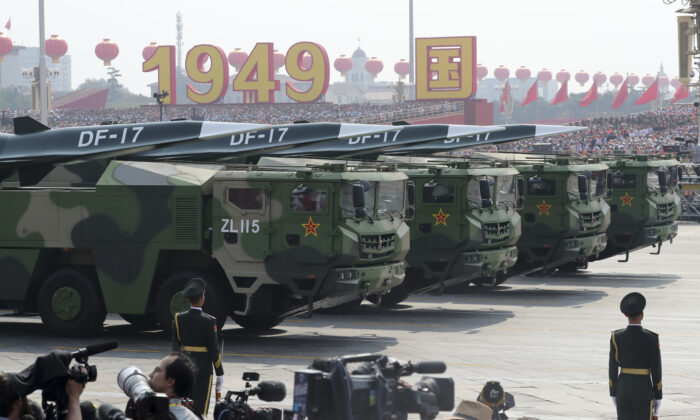
Military vehicles carrying DF-17 roll as members of a Chinese military
honor guard march during the parade to commemorate the 70th anniversary
of the founding of Communist China in Beijing on Oct. 1, 2019. (AP
Photo/Ng Han Guan)
China’s communist regime is destabilizing global security and encouraging nuclear proliferation among nations, according to a new report.
The Chinese Communist Party (CCP), which rules China as a single-party state, is rapidly expanding its nuclear arsenal, said Richard Weitz, a senior fellow at conservative think tank Hudson Institute.
“China’s nuclear buildup, as noted by many, has been awesome,” Weitz said during an April 5 launch event for a new report that he helped author on the subject.
“It’s rapidly increasing not only its nuclear warheads, but also its delivery systems and improving their effectiveness.”
The China regime’s efforts to expand and enhance its nuclear arsenal have come under scrutiny since November of 2021, following the publication of a Pentagon report that warned the regime would likely have 1,000 nuclear weapons by 2030.
That report also stated that China will have at least 200 land-based nuclear missiles capable of hitting the United States by 2026.
Weitz said that the CCP refuses to engage in nonproliferation discussions, however, no matter how harsh the blowback from the United States and other powers throughout the world.
“We still see China, despite this buildup, refuse to participate in strategic arms reduction talks, or even engage with many countries on risk reduction measures,” Weitz said.
To that end, the regime also appears particularly interested in fielding nuclear capabilities that can target the U.S. homeland and its forces in the Indo-Pacific.
Indeed, the regime now fields more long-range, nuclear-capable missile launchers than the United States, according to Rep. Mike Rogers (R-Ala.), who acknowledged in February that China leapfrogged the United States in the number of its active intercontinental ballistic missile (ICBM) launchers.
“The CCP is rapidly expanding its nuclear capability,” Rogers said. “They have doubled their number of warheads in two years. We estimated it would take them a decade to do that.”
“We also were just informed by the DoD [Department of Defense] that the CCP now has more ICBM launchers than the United States.”
China Destabilizing Global Security Space
The regime’s onslaught of nuclear development programs is not only a source of concern for the United States, Weitz said, but it is upsetting the stability of regions throughout the world.
“China’s buildup is having an adverse effect on global security and regional security issues,” Weitz said.
“It’s complicating the military planning of states, it’s increasing strategic unpredictability … and it is encouraging proliferation of nuclear weapons and nuclear means of delivery to other states.”
Weitz noted that the CCP is now working to counter international sanctions against Iran and North Korea’s nuclear programs, despite previously supporting such actions. Likewise, he said, the CCP is obfuscating what attempts it is taking to prevent non-state actors from obtaining nuclear weapons.
“We’ve seen the Chinese [Communist Party] reduce its support for international sanctions… on North Korea and Iran,” Weitz said.
Chinese communist entities have also “exploited Iran’s alienation from the West to expand their ties with the Iranian government,” Weitz added, saying that the CCP is possibly assisting the regime’s nuclear program.
No comments:
Post a Comment